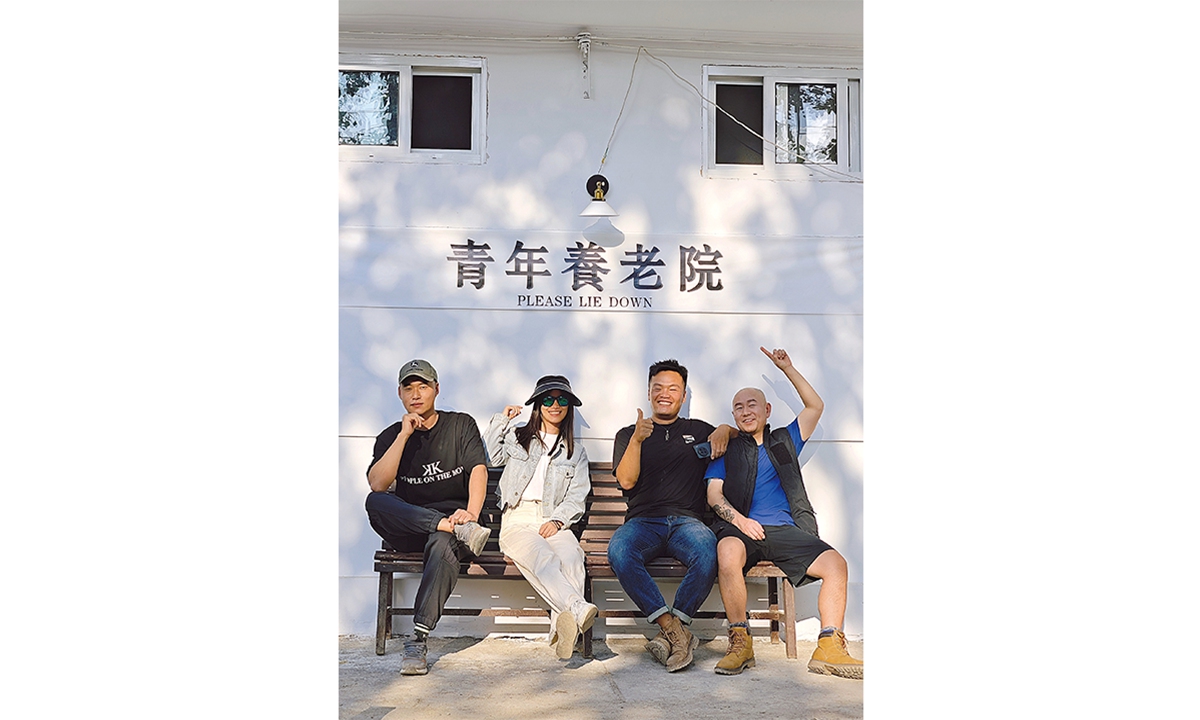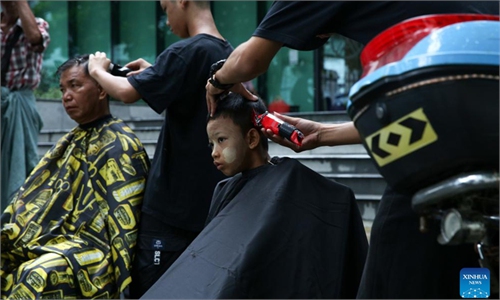ARTS / CULTURE & LEISURE
Young Chinese seek havens for a better restart
Breaking norms
Set against the green mountains and lush vegetation, the residence faces a beautiful pond. Within the scenic Mandiu Ancient Village in the Dai Autonomous Prefecture of Xishuangbanna, Southwest China's Yunnan Province, lies a commune dedicated to the young people.

Lu Boke, owner of the commune, told the Global Times that the center is named Wen Chao. "Wen" means asking, and "Chao" refers "to dwell" in Chinese. "We hope young people will gather here to learn, socialize, and resolve their inner struggles or find serenity through communication, introspection and interaction with others.
Retreats targeted at young customers in China have become a new topic of interest. Unlike more traditional institutions within the country such as retirement homes providing long-term care for the elderly, these wellness centers offer a space for relaxation, socializing, and short-term stays for young people. Created by young people in their 20s and 30s, they attract others of the same age to take up a lifestyle that resembles that of "retirement." At first, some criticized young people for giving up working hard, and "lying flat," but such criticism often stems from a lack of understanding of the concept of a retreat or wellness center.
Often referred to as "retirement homes for the young," these centers attract people seeking a slower pace of life, physical and mental relaxation, or a chance to rethink their life direction. Despite the name, they function more like a new social space combining leisure and social interaction, helping young people recharge, relieve stress, and prepare to better return to daily life or embark on a new journey.
Harbor of restoration
Before establishing the center, 32-year-old Lu had been engaged in youth community work for a long time, always interacting with young people, thinking about how to make a positive impact on their life. In October 2022, he decided to pursue the project, in the hope of providing a retreat-like comfortable environment, a safe space for young people to enjoy a free life at the lowest possible cost. Meanwhile, he hopes young people will exchange ideas, interact, and inspire one another. They chose Mandiu Ancient Village for its low costs and its natural environment of mountains and rivers, as well as the simplicity of the local villagers' lifestyle.
The home has been operating for more than a year now, with a daily average resident population of 10 to 15 people. Lu just expected freelancers to choose this kind of lifestyle, but to his surprise, many white collars have joined them to take a break.
Taking a break from their phones and laptops, some young residents choose to get up early and enjoy a good workout in nature, while some decide to sleep in. The center organizes activities like practicing Baduanjin, farming, hiking to the waterfall, learning martial arts, or meditating together. In the evenings, music events are held. Some white-collar young professionals, who had grown up in the city, were unfamiliar with farming at first. "When they felt the fresh soil under their bare feet, this brand-new experience helped them let go of themselves. Next day, you could see them wearing straw hats and excitedly working in the fields all day," said Lu.
Some young residents were deeply touched by their interactions with the local villagers, who offer them fresh picked fruits from their farms for free. In big cities, people easily grow distant from each other. Yet here, in this rural environment, human connections are simpler way of life unpretentious and inspire a happier one.
"The residents are all strangers, and this fact actually makes it easier for young people to open up, confide in others. There's no judgement. No burden. It's like a support group. They share their problems, raise questions about things happening in their life with each other, and help each other to seek some answers," Lu said.
The relaxed and healing atmosphere created by the center not only fulfills some young people's desire for a slow-paced life, but also allows others to hit pause briefly, heal their anxiety, and soothe their minds.
Behind the trend
The reason why retreats like this are gaining rapid popularity is mainly because it meets the psychological needs of young people. Faced with pressures from work, life or society, they long to temporarily detach from the hectic urban life and find a harbor to slow down and relax. These havens provide such a space, allowing young people to relieve stress through nature and leisurely activities.
These places offer not only a calm, safe environment but also various workshops, and interactive activities, helping young people find solace in social interactions and learning, promoting self-growth and inner exploration. At the same time, they foster connections through group activities and community life, allowing participants to build friendships and feel the warmth of a community.
This lifestyle concept attracts young people seeking fresh experiences and willing to try different ways of living and encourages young people to enjoy the present while contemplating the future.
"The trend actually reflects the higher aspirations of China's new generation. They are not passively swept forward by life or simply following the traditional social norms and life trajectories. They need and are willing to come to a place like this, to rest and adjust, so they can restart from a better place. This reflects their life attitude of being good at self-reflection and self-adjustment. They dare to try new experiences and lifestyles, without any fear," added Lu.

Young people pose for a group picture at Wen Chao retreat, located within the Mandiu Ancient Village, in the Dai Autonomous Prefecture of Xishuangbanna, Southwest China's Yunnan Province. Photo: Courtesy of Lu Boke
Here, young residents start their morning with a coffee, practice Baduanjin, a form of Chinese aerobic exercise, sometimes replaced by a meditation session. In the afternoon, they can fish or help the owner with farming. As night falls, they gather around a bonfire, and confide with some newly made friends, who were complete strangers before arrival.Lu Boke, owner of the commune, told the Global Times that the center is named Wen Chao. "Wen" means asking, and "Chao" refers "to dwell" in Chinese. "We hope young people will gather here to learn, socialize, and resolve their inner struggles or find serenity through communication, introspection and interaction with others.
Retreats targeted at young customers in China have become a new topic of interest. Unlike more traditional institutions within the country such as retirement homes providing long-term care for the elderly, these wellness centers offer a space for relaxation, socializing, and short-term stays for young people. Created by young people in their 20s and 30s, they attract others of the same age to take up a lifestyle that resembles that of "retirement." At first, some criticized young people for giving up working hard, and "lying flat," but such criticism often stems from a lack of understanding of the concept of a retreat or wellness center.
Often referred to as "retirement homes for the young," these centers attract people seeking a slower pace of life, physical and mental relaxation, or a chance to rethink their life direction. Despite the name, they function more like a new social space combining leisure and social interaction, helping young people recharge, relieve stress, and prepare to better return to daily life or embark on a new journey.
Harbor of restoration
Before establishing the center, 32-year-old Lu had been engaged in youth community work for a long time, always interacting with young people, thinking about how to make a positive impact on their life. In October 2022, he decided to pursue the project, in the hope of providing a retreat-like comfortable environment, a safe space for young people to enjoy a free life at the lowest possible cost. Meanwhile, he hopes young people will exchange ideas, interact, and inspire one another. They chose Mandiu Ancient Village for its low costs and its natural environment of mountains and rivers, as well as the simplicity of the local villagers' lifestyle.
The home has been operating for more than a year now, with a daily average resident population of 10 to 15 people. Lu just expected freelancers to choose this kind of lifestyle, but to his surprise, many white collars have joined them to take a break.
Taking a break from their phones and laptops, some young residents choose to get up early and enjoy a good workout in nature, while some decide to sleep in. The center organizes activities like practicing Baduanjin, farming, hiking to the waterfall, learning martial arts, or meditating together. In the evenings, music events are held. Some white-collar young professionals, who had grown up in the city, were unfamiliar with farming at first. "When they felt the fresh soil under their bare feet, this brand-new experience helped them let go of themselves. Next day, you could see them wearing straw hats and excitedly working in the fields all day," said Lu.
Some young residents were deeply touched by their interactions with the local villagers, who offer them fresh picked fruits from their farms for free. In big cities, people easily grow distant from each other. Yet here, in this rural environment, human connections are simpler way of life unpretentious and inspire a happier one.
"The residents are all strangers, and this fact actually makes it easier for young people to open up, confide in others. There's no judgement. No burden. It's like a support group. They share their problems, raise questions about things happening in their life with each other, and help each other to seek some answers," Lu said.
The relaxed and healing atmosphere created by the center not only fulfills some young people's desire for a slow-paced life, but also allows others to hit pause briefly, heal their anxiety, and soothe their minds.
Behind the trend
The reason why retreats like this are gaining rapid popularity is mainly because it meets the psychological needs of young people. Faced with pressures from work, life or society, they long to temporarily detach from the hectic urban life and find a harbor to slow down and relax. These havens provide such a space, allowing young people to relieve stress through nature and leisurely activities.
These places offer not only a calm, safe environment but also various workshops, and interactive activities, helping young people find solace in social interactions and learning, promoting self-growth and inner exploration. At the same time, they foster connections through group activities and community life, allowing participants to build friendships and feel the warmth of a community.
This lifestyle concept attracts young people seeking fresh experiences and willing to try different ways of living and encourages young people to enjoy the present while contemplating the future.
"The trend actually reflects the higher aspirations of China's new generation. They are not passively swept forward by life or simply following the traditional social norms and life trajectories. They need and are willing to come to a place like this, to rest and adjust, so they can restart from a better place. This reflects their life attitude of being good at self-reflection and self-adjustment. They dare to try new experiences and lifestyles, without any fear," added Lu.



